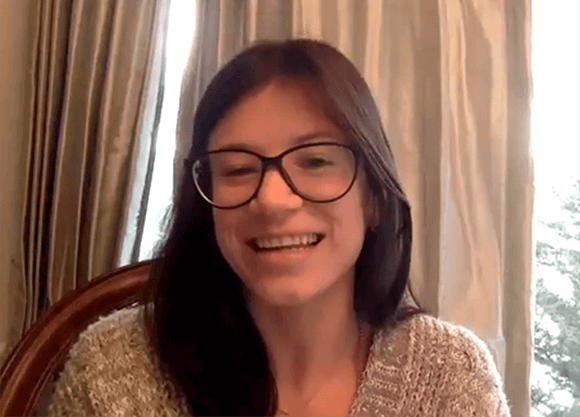
Economics majors guide high school students to financial literacy
December 07, 2020

December 07, 2020

The program has been kicked off with economics majors reconnecting with teachers from their former high schools, and then scheduling Zoom-based classroom discussions with their classes.
“We thought it’d be a great way of giving back, building connections and giving our students some experience,” said Linda Fisher, Assistant Teaching Professor of Economics. “My students were thrilled to connect with their old high school teachers; they are proud of what they’ve done at Quinnipiac and their teachers are proud to have successful alumni talk with their classes.”
From there, interested high school teachers ask the Quinnipiac faculty to talk to their classes about topics of interest and a Zoom meeting is arranged.
Chris Ball, Associate Professor of Economics, hosted the first high school visit on December 2, discussing macroeconomics with an Advanced Placement economics class from Westfield Public High School in Westfield, Massachusetts.
Jack French ’21, who works on the data science and economic research team at Quinnipiac and conducts research with Ball, and Londyn Zografakis ’20, JD ’22, a 3+3 accelerated dual-degree student, pioneered the partnership.
“There’s sort of two camps if you watch or read the news,” explained French, during a short presentation of his research on stock markets and GDP growth, before answering students’ questions. “On the one hand, people claim that stock markets are totally disconnected from economic reality, especially GDP, today. On the other hand, everyone treats the stock market going up or down like a sign of underlying economic health. So I’ve been working with Professor Ball on research looking at stock returns and GDP in multiple countries over the last 50 years.”
Students asked about how research works in college.
“There are a range of options,” he said. “The key is to talk with your professors and let them know your interests. If you are passionate and hard-working, there are lots of opportunities, at least in my experience at Quinnipiac.”
Zografakis offered her perspective on going from high school to undergraduate to law school in just three years.
“Economics is everywhere and you can use an economic approach for nearly any topic,” she said. “I use it all the time in law school, and even just finished a whole course on law and economics.”
She explained how her apprehension about attending college was quickly relieved upon entering Quinnipiac.
“I got to know all my professors and still stay in touch with them,” Zografakis said. “Go to their office hours and get to know your professors.”
She discussed her opportunities to travel internationally as part of the program at Quinnipiac.
“Through Professor Ball’s contacts in Hungary, I attended a summer course in Budapest at the Hungarian Central Bank,” Zografakis said. “I learned about financial technology, which was a big focus. I found it super interesting, so that became the subject of my senior seminar paper.”
The economics department hopes to expand the program to more high schools and students.
“It’s great experience for our students and they are so happy to give back,” Ball explained. “I think we’re all proudest when we can showcase our students and they are, of course, Quinnipiac’s best advocates.”
Quinnipiac Today is your source for what's happening throughout #BobcatNation. Sign up for our weekly email newsletter to be among the first to know about news, events and members of our Bobcat family who are making a positive difference in our world.
Sign Up Now